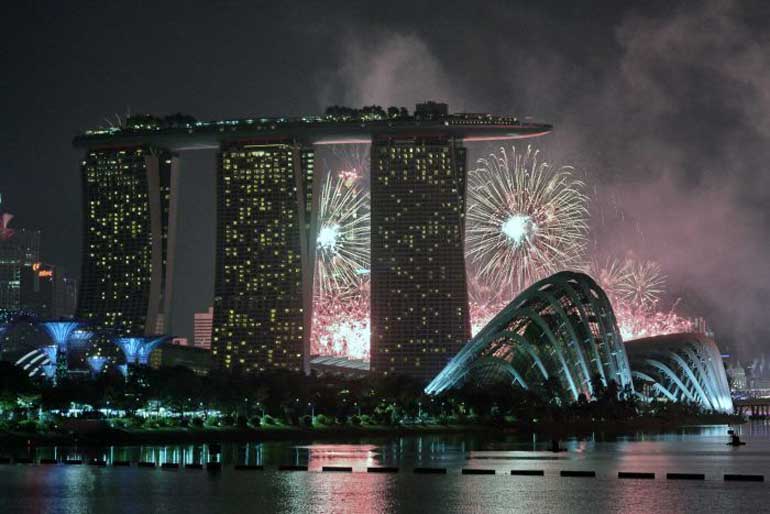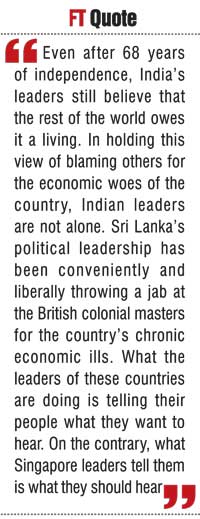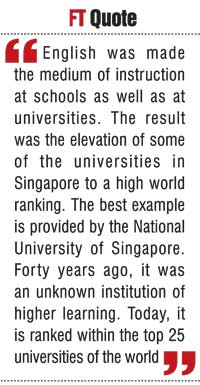Thursday Apr 25, 2024
Thursday Apr 25, 2024
Monday, 10 August 2015 00:10 - - {{hitsCtrl.values.hits}}

Singapore is presently celebrating its 50th year of independence with much fanfare and delight. Since gaining its independence, the country has blossomed into an ideal example of how a small but determined nation can transform itself into a regional juggernaut
Singapore celebrated its Golden Jubilee on 9 August. The event was marked by a month-long public discussion on what it had attained and a debate as to where it should go from here.
According to Singapore’s Prime Minister Lee Hsien Loong, the next destination for the city state is to go to the ‘next level’ where it would be a smart nation. A smart nation will have more intellectual workers than simple labour spenders. Such intellectual workers would, instead of copying from others, imagine and create new things for the world.
Smartness, therefore, does not come free. It needs a massive investment in upgrading the brainpower of its workforce by putting them on a continuous learning curve. That quality will come from increased investments in research and development in the first place. Then, what is developed has to be marketed to entrepreneurs who would use it for economic gain.
This is nothing but entrepreneurial application of inventions, called ‘innovation’ by Austrian-American economist Joseph Schumpeter as far back as 1942. As such, the Smart Singapore will invent new things and innovate them at home as well as elsewhere. To prepare the nation to acquire this capability, Singapore has allocated some S$ 16 billion or US$ 12 billion, according to reports.
A country awed by both peers and superiors
Singapore, a backward port city 50 years ago, awed the rest of the world by becoming a rich nation within two generations. Its achievements were the subject of praise not only by its peers who were left behind by Singapore, but also by the rich world which it surpassed.
This was eloquently pronounced by Australian Prime Minister Tony Abott when he proposed the vote of condolence on Lee Kuan Yew in Australian Parliament. He said that in 1965, Singapore’s per capita income was a third of Australia’s. But today, it is two times higher than that of Australia’s.
Singapore viewed as a role model
Many developing nations, therefore, looked at Singapore as a role model for emulation. If Singapore, devoid of natural resources, could become a rich nation so quickly, why not us with all these natural resources around us?
That was the argument put forward by politicians and policymakers in poor countries. Sri Lanka too, after it opened its economy in 1977, declared openly that it wants to become the Singapore of South Asia. But even after four decades, Sri Lanka is nowhere near Singapore with respect to economic prosperity, development of brainpower and the use of an effective Government.
Hence, it is useful to examine how Singapore made its achievements, why Sri Lanka’s dreams were shattered and what Sri Lanka should do to follow in its footsteps.
No one owes a living to Singaporeans
The credit for Singapore’s economic success is shared equally by its forefathers who are called the old guard. Among them, Lee Kuan Yew, Singapore’s Prime Minister, and Goh Keng Swee, its first Finance Minister, stand out prominently.
Swee, on the Silver Jubilee Celebration of Singapore’s Currency Board, revisited the rationale of the economic policy they adopted in an article entitled ‘Why a Currency Board?’. Singapore was a British colony for more than a century. Hence, it is natural for leaders of colonies to blame their colonial masters for all the economic ills they were having. But Goh Keng Swee says that they believed that no one owed a living to Singaporeans. Their destiny was in their own hands and they had to work hard for that.
Blaming colonial masters for economic ills even many years after independence
This viewpoint of a newly-independent nation is in stark contrast with those uttered by leaders of other such nations. They always blame the colonial masters for the economic ills they are experiencing. The latest such Colonial Master bashing was done in a speech delivered by Indian legislator Dr. Shashi Tharoor at Oxford Union recently. Tharoor boldly announced to an applauding audience that Britain should compensate India for the destruction of its economy during colonial rule.
At a subsequent meeting, India’s Prime Minister Narendra Modi too praised Tharoor for his Oxford Union speech endorsing what he said there. Thus, even after 68 years of independence, India’s leaders still believe that the rest of the world owes it a living. In holding this view of blaming others for the economic woes of the country, Indian leaders are not alone. Sri Lanka’s political leadership has been conveniently and liberally throwing a jab at the British colonial masters for the country’s chronic economic ills. What the leaders of these countries are doing is telling their people what they want to hear. On the contrary, what Singapore leaders tell them is what they should hear.
Hard work is the key to prosperity
As Swee has revealed, the economic policy followed by the old guard was based on one premise: if people wanted better public services, they should be prepared to pay for them. Thus, in the words of Swee, people should keep in mind that there was no such thing as a free lunch. The prosperity should come, not by giving things free or by printing money through the Central Bank. Prosperity comes when people work hard.
Hard work should be practised, according to Swee, by students at schools, undergraduates at universities and workers at workplaces. The incentive system in Singapore was designed right from the beginning for people to work hard and get remunerated accordingly. 
Swee says that having such a policy, the old guard wanted to deliver three important messages to people, future politicians and foreigners. To the people, as mentioned above, they should be ready to pay for public services.
To the future politicians, if they desire to go for vote-catching expenditure programs, they should bring money from homes. They cannot use moneys paid by taxpayers or moneys printed by the Central Bank for that purpose. To the foreigners, they could lend their savings to Singapore and Singapore would guarantee that their moneys will be returned on the due dates with proper interest.
Discipline on both money printing and budgetary expenditure
Thus, right from the beginning, it was discipline across the Government that was practised by Singapore. To have discipline on the creation of money, Singapore decided to retain the currency board system which was inherited from the colonial masters. In a currency board system, the Government cannot print money according to its wishes. That is because the issue of currency is tied to the holding of an equivalent amount of foreign exchange assets.
Thus, if the country earns a net amount of foreign exchange through its international transactions, it can increase money supply to that extent. In the opposite, if the country loses foreign exchange, it has to cut down the money supply. This monetary discipline imposes discipline on the government budget as well. That is, since the budget has to be financed entirely out of taxpayers’ money, it cannot arbitrarily increase the level of government expenditure.
Accordingly, it forced Singapore to carefully balance the budget. That balanced budget brought in two salutary developments. It created an inflation-free world domestically, while strengthening the external value of the Singapore dollar. The budget discipline helped Singapore to spend a large amount of money on education, research and development and improving healthcare facilities. People were encouraged to save for their old age through a very stringent provident fund scheme.
Cheap money spoils a nation
Singapore did not join the IMF, World Bank or ADB in the first 40 years of independence. As a developing country, it could have used the concessionary funds available from the World Bank or ADB for long-term development projects.
Instead, it borrowed money from commercial markets to meet such expenditure. To a policymaker in any other developing country, this may appear to be an absurd decision. However, Singapore did so with good economic logic. If it had raised concessionary funds, it would have used them loosely without following strict economic criteria. But, when it borrows from commercial markets, it has to ensure that the funds are used in projects that would bring in adequate return to repay those loans. So, unlike in other developing countries, politicians in Singapore could not start their pet projects out of concessionary funds so raised.
It joined these three institutions only in the early 2000s to facilitate Singaporean firms to become eligible for bidding for contracts in other countries when they are funded by either the World Bank or ADB. This is because, according to the requirements of these two institutions, services could be obtained for projects funded by them only from their member countries.
Politicians too have to undergo rigorous training
Singapore developed an effective public service led by an effective team of politicians. Public servants and politicians were paid good remunerations. The rationale for this, according to Lee Kuan Yew, was that if one pays peanuts to one’s servants, one could get only monkeys. The capacity development of public servants was given the highest priority with support from the best schools of business and government in the world. As for politicians, there was both a selection and election process in use. 
In terms of the selection process, prospective future political leaders were identified, handpicked and lured into politics. Once they have joined politics, they had to undergo a rigorous training and learning program. For instance, a politician identified as the future Minister of International Trade had to learn everything about trade theories, trade agreements, multilateral trading arrangements and bilateral trade negotiations. This apprenticeship period ranged between three to four years before they became ministers. If one examines the current profile of the Cabinet Ministers of Singapore, including its Prime Minister, one may find that almost everyone of them has completed the Master of Public Policy and Administration degree offered by the John F. Kennedy School of Government affiliated to Harvard University.
With this professional strength behind, Singaporean Ministers do not speak nonsense in public forums or TV interviews. Thus, a Singaporean Minister is unlikely to identify a ‘megapolis’ as a police force covering a province or an ‘eLibrary’ as an iPad.
Eliminate corruption at all levels
Singapore fought very hard against bribery and corruption at all levels of public life. It paid high salaries to public servants and politicians to kill the temptation to make extra money. At the same time, it was tough on those who were found to be engaged in corrupt practices. That applied to the children of the first family as well.
As mentioned by Lee Kuan Yew in his autobiography ‘From Third World to the First’, there was a public charge that one of his children had got involved in an improper land deal. This has happened when he had retired from active politics. Hence, Lee had asked the Prime Minister to make an independent investigation immediately. The inquiry had revealed that there was not any impropriety in the deal at all. Yet, Lee imposed the rules of the family good governance on his daughter and asked her to reverse the land deal.
Such an exemplary act cannot be expected from Sri Lanka’s political leaders today, though there had been some instances in good old days. An example for similar statesmanly act is found when Dudley Senanayake was the Prime Minister during 1965 to 1970. The daughter of his Minister of Education had got a scholarship from the Indian Government to study in an Indian University. When the Opposition charged that there was foul play, Dudley wanted to clear the good name of his party. He gave two options to the Education Minister: Either resign from the Cabinet or bring back the daughter from India. The Minister opted for the latter. But today, Sri Lanka is infested with political leaders who admit later that they have protected corrupt colleagues or go on defending top public officials who have been charged of committing improper acts.
Planning for the future instead of living in the past
Thus, the secret of Singapore’s success is the pursuit of good economic policy governance supported by an effective and incorrupt political system and public service. Discipline was maintained throughout the system with no exception for selected people. Even Ministers had to sweep the streets as punishment if they committed traffic offences. Education system was developed to international standards to produce smart workers. Courses were designed and introduced taking into account the future requirements of manpower. 
That was how Singapore became world famous for genetic sciences, nanotechnology and Information and Communication Technology – the drivers of future economic development. Universities were encouraged to team up with universities of repute in the world.
English was made the medium of instruction at schools as well as at universities. The result was the elevation of some of the universities in Singapore to a high world ranking. The best example is provided by the National University of Singapore. Forty years ago, it was an unknown institution of higher learning. Today, it is ranked within the top 25 universities of the world.
Develop brain power along with infrastructure
Singapore’s success story is marked by correct choices, sacrifices and integration to global economy. It developed its infrastructure on modern lines and brainpower to match the world requirements. It always chose policies that are to take Singapore to the future. Its plan to become a smart nation is in terms of this accepted vision.
On the contrary, supported by its political leaders, Sri Lanka continues to rejoice at its glorious past. Presumably, it may be in the belief that the past may be repeated automatically in the future as well. No wonder that the country has a shattered dream.
What Sri Lanka should do
If Sri Lanka is to emulate Singapore, it has to make a lot of sacrifices. At political level, all those seeking political office should undergo rigorous training and acquire political know-how. Ministerships should not be allocated on the basis of seniority or the loyalty to the party leader, but on the basis of competence, efficiency and delivery capacity. Education should be forward looking taking into account the brain requirements of the future. In that context, the balanced development of brains with science and mathematics on one hand and arts and literature on the other is a must.
Hence, the current downgrading of mathematics as unnecessary by even Ministers and Deputy Ministers of Education should be a cause for alarm. Sri Lanka will get a good opportunity to rectify its past mistakes at the forthcoming general election. If it fails to choose the correct path, Singapore will move into the smart age, while Sri Lanka will recede back to the old age.
(W.A. Wijewardena, a former Deputy Governor of the Central Bank of Sri Lanka, could be reached at [email protected] )